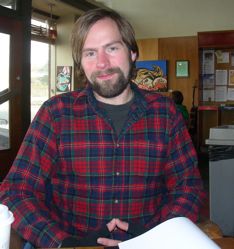 She wasn’t the only movie star ever to emerge from West Seattle – but Frances Farmer was inarguably the most controversial and tragic. However, local historian, musician, and lecturer Peder Andreas Nelson points out, that was only part of her story — she had a side that is not discussed as often as her sanity battle, and that little-remembered side is what will be celebrated this Friday and Saturday during “Frances Farmer’s Revenge” at the Admiral Theater, with a chance for you to re-live Hollywood’s heyday while learning how this tumultuous star shone more brightly than you may have ever heard. We sat down last week to talk with Peder, whose idea sparked the two-day Admiral festival, for a closer look at why her, and why now — read on:
She wasn’t the only movie star ever to emerge from West Seattle – but Frances Farmer was inarguably the most controversial and tragic. However, local historian, musician, and lecturer Peder Andreas Nelson points out, that was only part of her story — she had a side that is not discussed as often as her sanity battle, and that little-remembered side is what will be celebrated this Friday and Saturday during “Frances Farmer’s Revenge” at the Admiral Theater, with a chance for you to re-live Hollywood’s heyday while learning how this tumultuous star shone more brightly than you may have ever heard. We sat down last week to talk with Peder, whose idea sparked the two-day Admiral festival, for a closer look at why her, and why now — read on:
Separate from the tragic fight against mental illness for which she is most remembered today, Frances Farmer was known as the “Bad Girl of West Seattle” some time before her movie career — and it had nothing to do with morals.
While studying at West Seattle High School, she espoused radical ideas that you just didn’t hear much in those days — much less from a teenage girl. From the pages about her on HistoryLink.org:
Her first brush with national notoriety came during her senior year, in April 1931, when she won a $100 prize in a writing contest sponsored by The Scholastic, a magazine for high school students. Her essay, provocatively titled “God Dies,” caused an uproar. Seattle newspapers reported the news with headlines such as “Seattle Girl Denies God and Wins Prize.” Wire services picked up the stories and distributed them to papers around the country. In Seattle, local ministers pointed to Farmer and her high school English teacher, Belle McKenzie, as evidence of “rampant atheism” in the public schools.
While at the University of Washington a few years later, she won a trip to the Soviet Union by selling subscriptions for what HistoryLink describes as “a leftist newspaper.” That too put her back in the spotlight, and even her mother — a strident anti-Communist — was publicly upset about it. (Peder, however, notes that Frances’s mother also staunchly defended her daughter’s right to free speech, and was probably the biggest inspiration for Frances’s outspokenness, even though their views were at loggerheads.)
After the trip, Frances didn’t come back to West Seattle, where her family moved to Admiral from another part of the city in her childhood — she went to New York instead, and the publicity helped her get her foot in the movie industry’s door, enabling her triumphant return here a year-plus later, for the November 1936 premiere of “Come and Get It” at the Liberty Theater (1st and Pike, torn down in 1955; here’s its history) — the first of three movies to be shown at the Friday/Saturday festival at the Admiral.
 From there, the rest, as they say, is history – a lot of it — and Peder (photo left) will tell you about it in his presentation on Friday night at The Admiral. For the occasion, Mayor Nickels – whose North Admiral neighborhood isn’t far from where Frances Farmer and her family lived (49th/Admiral) — has declared Friday to be “Frances Farmer Day” in the city; Peder says they’ll be working to secure a more permanent designation, but this one-time proclamation is a start.
From there, the rest, as they say, is history – a lot of it — and Peder (photo left) will tell you about it in his presentation on Friday night at The Admiral. For the occasion, Mayor Nickels – whose North Admiral neighborhood isn’t far from where Frances Farmer and her family lived (49th/Admiral) — has declared Friday to be “Frances Farmer Day” in the city; Peder says they’ll be working to secure a more permanent designation, but this one-time proclamation is a start.
He says his fascination with her dates back to childhood in a nearby neighborhood, when his father would point out the Farmer home to him during walks; when Peder was a teenager, Nirvana’s song “Frances Farmer Will Have Her Revenge on Seattle” (which one of his bands will perform during the Admiral event) came out, and he says he got to tell all his friends she had lived “down the street” — including friends who heard her name and said “who?” He took pride in including untold aspects of her story even then; she was one of the top 10 alums in WSHS history, he notes.
Knowing that, it’s not surprising to hear the focus of his presentation at the Admiral on Friday is not on what happened to her because of mental illness, the story told before in books and film (in fact, the Jessica Lange movie “Frances” will be shown on Saturday night), but on her outspokenness, her work for social justice and labor rights, her attempts to break through the roadblocks that often were set in the way of outspoken women back then. “This is not a bummer – this is a celebration,” as he puts it. A celebration that he says Frances herself might have enjoyed, particularly since it’s at her hometown theater, and particularly since she apparently wasn’t in a particularly cheery mood for the 1936 Seattle premiere — not ready to forgive and forget how she was treated, Peder says, quoting her as pointing out she was remembered as “the freak from West Seattle.”
So on Friday night, it will be a “mock premiere,” for which Peder hopes people will “come dressed up in ’30s style if you can … ’30s clothing, hairdos, dress to the nines .. fancy evening wear.” There will even be a red carpet.
No doubt, of course, Frances’s descent into mental illness and institutionalization is a key part of her story, and local mental-health advocates from Navos (the former West Seattle Psychiatric Hospital) will be included in a presentation during the festival. Peder says, “She definitely had some erratic behavior (as well as) a large amount of stress, and her desire not to conform … also, they didn’t know much about depression back then. Now, (stars) can talk about (mental problems), even say they’re going to ‘check themselves in’ (to rehab, etc.).”
Besides that discussion, his presentation on her life, and the three movies — “Come and Get It” at 8:30 pm Friday, “Rhythm on the Range” (also featuring Spokane’s own Bing Crosby) at 4 pm Saturday and “Frances” at 8 pm Saturday — the event also will include a Saturday night afterparty at Shadow Land, the Junction bar and restaurant whose name is a nod to one of the Frances Farmer biographies, in part because of a suggestion by Peder, who’s friends with its proprietors. But bottom line: “This is about celebrating Frances Farmer for her life and what she did, away from all the tragedy.” (Frances, by the way, is buried in Indiana, where she died of cancer in 1970, just 56 years old.)
Find out lots more about the Friday-Saturday event at the official website, francesfarmersrevenge.net. Tickets are available online here, either for each individual movie, or a $20 pass for the entire two-day event.

| 5 COMMENTS